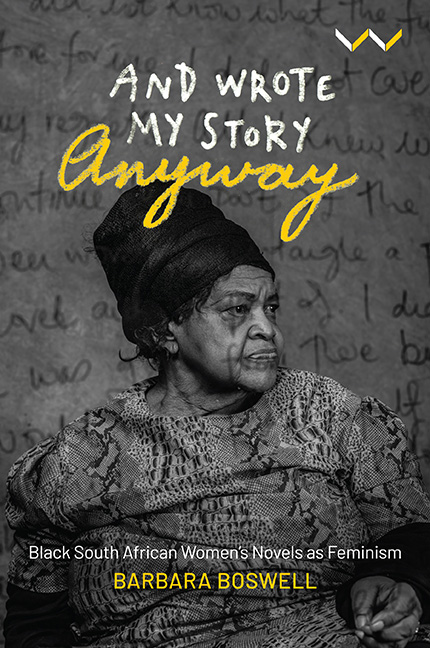Book contents
- Frontmatter
- Dedication
- Contents
- Acknowledgements
- Author's Preface
- Acronyms
- Introduction: ‘And Wrote My Story Anyway’: Black South African Women's Novels as Feminism
- 1 Writing as Activism: A History of Black South African Women's Writing
- 2 Rewriting the Apartheid Nation: Miriam Tlali and Lauretta Ngcobo
- 3 Dissenting Daughters: Girlhood and Nation in the Fiction of Farida Karodia and Agnes Sam
- 4 Interrogating ‘Truth’ in the Post-Apartheid Nation: Zoë Wicomb and Sindiwe Magona
- 5 Making Personhood: Remaking History in Yvette Christiansë and Rayda Jacobs's Neo-Slave Narratives
- 6 Black Women Writing ‘New’ South African Masculinities: Kagiso Lesego Molope and Zukiswa Wanner
- Conclusion: Towards a Black South African Feminist Criticism
- Select Bibliography
- Index
3 - Dissenting Daughters: Girlhood and Nation in the Fiction of Farida Karodia and Agnes Sam
Published online by Cambridge University Press: 15 June 2021
- Frontmatter
- Dedication
- Contents
- Acknowledgements
- Author's Preface
- Acronyms
- Introduction: ‘And Wrote My Story Anyway’: Black South African Women's Novels as Feminism
- 1 Writing as Activism: A History of Black South African Women's Writing
- 2 Rewriting the Apartheid Nation: Miriam Tlali and Lauretta Ngcobo
- 3 Dissenting Daughters: Girlhood and Nation in the Fiction of Farida Karodia and Agnes Sam
- 4 Interrogating ‘Truth’ in the Post-Apartheid Nation: Zoë Wicomb and Sindiwe Magona
- 5 Making Personhood: Remaking History in Yvette Christiansë and Rayda Jacobs's Neo-Slave Narratives
- 6 Black Women Writing ‘New’ South African Masculinities: Kagiso Lesego Molope and Zukiswa Wanner
- Conclusion: Towards a Black South African Feminist Criticism
- Select Bibliography
- Index
Summary
South African women of Indian descent form a category of South African writers until recently almost completely absent both in South African literary criticism and critical consideration within the field of South African English Studies. Until the publication of Devarakshanam Govinden's Sister Outsiders: The Representation of Identity and Difference in Selected Writings by South African Indian Women (2008), South African Indian women's writing fell between the literary cracks of black South African writing, and ‘Indian’ writing, with both areas of study dominated by the analysis of men's writing. Training a critical lens on the writing of women of Indian descent in South Africa, Govinden (2008, 2) argues that such writers’ pervasive concerns are ‘those of colonial and neo-colonial domination (and in South Africa, rampant racial oppression), dispossession and cultural fragmentation, finding and defining “home”, crises of identity, and living with differences’. Attentive to the critical ‘disappearance’ of Indian women's literary production in South Africa, Govinden (2008, 3) seeks to draw attention to ‘a neglected corpus of writing in South African literary criticism’. As Govinden (2–3) cogently argues:
With some effort, one may discover that Indian women's writing in South Africa also provides a useful lens with which to read and reread the important issues of our time. As with those of other black women writers in South Africa who were largely excluded and ‘othered’, autobiographical, fictional and discursive writing produced by Indian women in South Africa constitutes a way of ‘talking back’, and it demands to be recognised as such.
Departing from Govinden's premise that Indian women's subjectivity, as portrayed in their fiction, provides a singular lens through which to examine significant moments in the construct of the nation, this chapter examines South African Indian girlhood and female subjectivity during the apartheid era as portrayed in Farida Karodia's Daughters of the Twilight (1986) and Agnes Sam's short story, ‘Jesus is Indian’ (1989). Particular attention is paid to the ways in which contact with coloniality and the apartheid system positions the young protagonists of both texts in a liminal space between their ‘Indianness’ and colonial culture, and examines the ways in which the girls negotiate their identities within the racial tumult of the apartheid years.
- Type
- Chapter
- Information
- And Wrote My Story AnywayBlack South African Women's Novels as Feminism, pp. 89 - 114Publisher: Wits University PressPrint publication year: 2021



